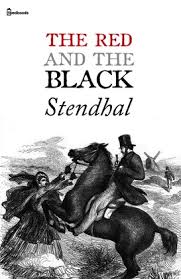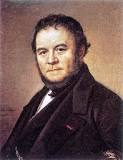The Red and the Black Page #5
Le Rouge et le Noir is a historical psychological novel in two volumes by Stendhal, published in 1830. It chronicles the attempts of a provincial young man to rise socially beyond his modest upbringing through a combination of talent, hard work, deception, and hypocrisy.
I find personally only one thing at which to cavil in the COURS DE LA FIDELITE, (this official name is to be read in fifteen to twenty places on those immortal tiles which earned M. de Rênal an extra cross.) The grievance I find in the Cours de la Fidélité is the barbarous manner in which the authorities have cut these vigorous plane trees and clipped them to the quick. In fact they really resemble with their dwarfed, rounded and flattened heads the most vulgar plants of the vegetable garden, while they are really capable of attaining the magnificent development of the English plane trees. But the wish of M. the mayor is despotic, and all the trees belonging to the municipality are ruthlessly pruned twice a year. The local Liberals suggest, but they are probably exaggerating, that the hand of the official gardener has become much more severe, since M. the Vicar Maslon started appropriating the clippings. This young ecclesiastic was sent to Besançon some years ago to keep watch on the abbé Chélan and some cures in the neighbouring districts. An old Surgeon-Major of Napoleon's Italian Army, who was living in retirement at Verrières, and who had been in his time described by M. the mayor as both a Jacobin and a Bonapartiste, dared to complain to the mayor one day of the periodical mutilation of these fine trees. "I like the shade," answered M. de Rênal, with just a tinge of that hauteur which becomes a mayor when he is talking to a surgeon, who is a member of the Legion of Honour. "I like the shade, I have my trees clipped in order to give shade, and I cannot conceive that a tree can have any other purpose, provided of course it is not bringing in any profit, like the useful walnut tree." This is the great word which is all decisive at Verrières. "BRINGING IN PROFIT," this word alone sums up the habitual trend of thought of more than three-quarters of the inhabitants. Bringing in profit is the consideration which decides everything in this little town which you thought so pretty. The stranger who arrives in the town is fascinated by the beauty of the fresh deep valleys which surround it, and he imagines at first that the inhabitants have an appreciation of the beautiful. They talk only too frequently of the beauty of their country, and it cannot be denied that they lay great stress on it, but the reason is that it attracts a number of strangers, whose money enriches the inn-keepers, a process which brings in profit to the town, owing to the machinery of the octroi. It was on a fine, autumn day that M. de Rênal was taking a promenade on the Cours de la Fidélité with his wife on his arm. While listening to her husband (who was talking in a somewhat solemn manner) Madame de Rênal followed anxiously with her eyes the movements of three little boys. The eldest, who might have been eleven years old, went too frequently near the parapet and looked as though he was going to climb up it. A sweet voice then pronounced the name of Adolphe and the child gave up his ambitious project. Madame de Rênal seemed a woman of thirty years of age but still fairly pretty. "He may be sorry for it, may this fine gentleman from Paris," said M. de Rênal, with an offended air and a face even paler than usual. "I am not without a few friends at court!" But though I want to talk to you about the provinces for two hundred pages, I lack the requisite barbarity to make you undergo all the long-windedness and circumlocutions of a provincial dialogue. This fine gentleman from Paris, who was so odious to the mayor of Verrières, was no other than the M. Appert, who had two days previously managed to find his way not only into the prison and workhouse of Verrières, but also into the hospital, which was gratuitously conducted by the mayor and the principal proprietors of the district. "But," said Madame de Rênal timidly, "what harm can this Paris gentleman do you, since you administer the poor fund with the utmost scrupulous honesty?" "He only comes to throw blame and afterwards he will get some articles into the Liberal press." "You never read them, my dear." "But they always talk to us about those Jacobin articles, all that distracts us and prevents us from doing good.[1] Personally, I shall never forgive the curé." [1] Historically true. CHAPTER III THE POOR FUND A virtuous curé who does not intrigue is a providence for the village.--Fleury It should be mentioned that the curé of Verrières, an old man of ninety, who owed to the bracing mountain air an iron constitution and an iron character, had the right to visit the prison, the hospital and the workhouse at any hour. It had been at precisely six o'clock in the morning that M. Appert, who had a Paris recommendation to the curé, had been shrewd enough to arrive at a little inquisitive town. He had immediately gone on to the curé's house. The curé Chélan became pensive as he read the letter written to him by the M. le Marquis de La Mole, Peer of France, and the richest landed proprietor of the province. "I am old and beloved here," he said to himself in a whisper, "they would not dare!" Then he suddenly turned to the gentleman from Paris, with eyes, which in spite of his great age, shone with that sacred fire which betokens the delight of doing a fine but slightly dangerous act. "Come with me, sir," he said, "but please do not express any opinion of the things which we shall see, in the presence of the jailer, and above all not in the presence of the superintendents of the workhouse." M. Appert realised that he had to do with a man of spirit. He followed the venerable curé, visited the hospital and workhouse, put a lot of questions, but in spite of somewhat extraordinary answers, did not indulge in the slightest expression of censure. This visit lasted several hours; the curé invited M. Appert to dine, but the latter made the excuse of having some letters to write; as a matter of fact, he did not wish to compromise his generous companion to any further extent. About three o'clock these gentlemen went to finish their inspection of the workhouse and then returned to the prison. There they found the jailer by the gate, a kind of giant, six feet high, with bow legs. His ignoble face had become hideous by reason of his terror.
Translation
Translate and read this book in other languages:
Select another language:
- - Select -
- 简体中文 (Chinese - Simplified)
- 繁體中文 (Chinese - Traditional)
- Español (Spanish)
- Esperanto (Esperanto)
- 日本語 (Japanese)
- Português (Portuguese)
- Deutsch (German)
- العربية (Arabic)
- Français (French)
- Русский (Russian)
- ಕನ್ನಡ (Kannada)
- 한국어 (Korean)
- עברית (Hebrew)
- Gaeilge (Irish)
- Українська (Ukrainian)
- اردو (Urdu)
- Magyar (Hungarian)
- मानक हिन्दी (Hindi)
- Indonesia (Indonesian)
- Italiano (Italian)
- தமிழ் (Tamil)
- Türkçe (Turkish)
- తెలుగు (Telugu)
- ภาษาไทย (Thai)
- Tiếng Việt (Vietnamese)
- Čeština (Czech)
- Polski (Polish)
- Bahasa Indonesia (Indonesian)
- Românește (Romanian)
- Nederlands (Dutch)
- Ελληνικά (Greek)
- Latinum (Latin)
- Svenska (Swedish)
- Dansk (Danish)
- Suomi (Finnish)
- فارسی (Persian)
- ייִדיש (Yiddish)
- հայերեն (Armenian)
- Norsk (Norwegian)
- English (English)
Citation
Use the citation below to add this book to your bibliography:
Style:MLAChicagoAPA
"The Red and the Black Books." Literature.com. STANDS4 LLC, 2025. Web. 6 Mar. 2025. <https://www.literature.com/book/the_red_and_the_black_201>.








Discuss this The Red and the Black book with the community:
Report Comment
We're doing our best to make sure our content is useful, accurate and safe.
If by any chance you spot an inappropriate comment while navigating through our website please use this form to let us know, and we'll take care of it shortly.
Attachment
You need to be logged in to favorite.
Log In